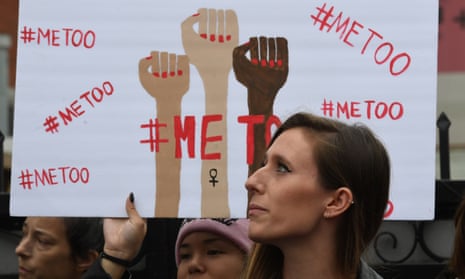The #MeToo movement can reasonably be described as kicking off on 5 October 2017, with a New York Times report Harvey Weinstein Paid Off Sexual Harassment Accusers for Decades that contained the accounts of eight women who said they were sexually harassed or assaulted by the now-disgraced Hollywood producer.
Weinstein is now facing a trial for his alleged crimes. But what followed the Times’ story was a deluge of accusations of sexual misconduct toward women by men – often with a straight-forward power dynamic between older, professionally accomplished men and younger, often vulnerable, women trying to establish a career. Many of the biggest names in media, the arts and politics were brought down.
Now, after the revelations and the downfalls, what is following is a flood of books on the #MeToo movement and how it has begun to reshape gender relations.
New York Times reporters Jodi Kantor and Megan Twohey have chronicled their Weinstein exposé in She Said, a powerful review published last week of what it took to break the Weinstein story.
It joins other books that have already attempted to describe both the roots of the #MeToo movement, including Linda Hirshman’s excellent Reckoning: The Epic Battle Against Sexual Abuse and Harassment, and the latent anger that informs it, including Rebecca Traister’s exploration of the transformative power of female anger, Good and Mad. And there are more books coming on other famous #MeToo cases such as the downfall of TV executive Les Moonves, New Yorker writer Ronan Farrow’s account of his own multiple #MeToo investigations, including on Weinstein, and books on abuse scandals in sports and politics.
“It’s unprecedented because the #MeToo movement is unprecedented,” said Henry Holt editor Libby Burton. “If the publishing industry works as it should, it can capture a cultural moment in a way that solidifies it, adds legitimacy, and hopefully create social and societal change.”
She Said examines what happens when a bully is cornered and his defenses – non-disclosure agreements and other more basic, brutal methods of ensuring silence – are stripped away. Actors Rose McGowan and Gwyneth Paltrow appear as heroes of the hour; the women’s right lawyer Lisa Bloom, the villain for her part – since regretted – in attempting throw off the journalists’ investigation and thwart his accusers.
Other books, too, have powerful narratives and colorful casts of characters as the #MeToo phenomenon becomes it own mini-publishing pantheon.
In October, Farrow, winner of a Pulitzer Prize for his reporting on Weinstein in the New Yorker, is set to publish Catch and Kill, described by his publisher as “a true account of the extreme tactics powerful men use to cover up crimes and abuse”.
His reporting closely followed the Times’, adding the accounts of 13 women who alleged sexual harassment, assault or rape against Weinstein. Farrow’s new book promises to expose corruption “from Hollywood to Washington and beyond” and the ways in which “surveillance and intimidation [were] deployed by wealthy and connected men to threaten journalists, evade accountability, and silence victims of abuse.”
Also in the Weinstein file is Ken Auletta’s coming account of attempting to confront the movie producer as far back as 2002. “His bullying with women, or sexual predations, was a natural outgrowth — that’s the way he treated everyone, male or female,” Auletta recently told Peter Kafka’s Recode Media.
Ultimately, Auletta was unable to unpick the knots of nondisclosure agreements Weinstein used to silence his alleged victims. Auletta says when he confronted Weinstein, the movie producer started to cry and told the writer he’d ruin his marriage.
The MeToo accounts don’t stop at Hollywood or entertainment.
Abigail Pesta’s retelling of the serial sexual abuse of young gymnasts by Larry Nassar tackles the shocking story of the now-jailed USA Gymnastics national team doctor and osteopathic physician at Michigan State University.
New York Times reporters Rachel Abrams and James Stewart delve into allegations of sexual harassment and assault by former CBS chief executive Moonves. The Education of Brett Kavanaugh, by the Times reporters Robin Pogrebin and Kate Kelly, looks into accusations of sexual assault against supreme court justice Kavanaugh by Christine Blasey Ford.
And there’s Tanya Selvaratnam’s account Assume Nothing, which tells her story of falling into an abusive relationship with former New York State attorney general Eric Schneiderman, forced to step down while overseeing efforts to prosecute Weinstein.
Julie Brown, whose series of investigative stories in the Miami Herald helped reignite the scandal around sex offender Jeffrey Epstein, also has a book coming. Publisher HarperCollins says the book “will expose the inner workings of the sexual pyramid scheme Jeffrey Epstein forced the girls into, and will implicate powerful, wealthy and influential politicians, academics, businessmen and public figures”.
As the #MeToo movement progresses, it’s possible there won’t be another story as enveloping, or one that reaches as far into wealth and power as Epstein’s, whose upscale social circles include many rich and famous and powerful men.
But i f there are any cautions here, it’s that these stories tend to reflect a very narrow cast of society, says Henry Holt’s Burton. Left behind in many of these accounts are the day-to-day stories that women face everywhere in their workplaces, homes and social settings.
“These stories are about women in more powerful positions, actresses or people in the media, without recognizing how this has affected so many populations, including women of color or women with less economic clout. It’s not just in Hollywood or New York media, but it’s across the country and across the world,” Burton said.
